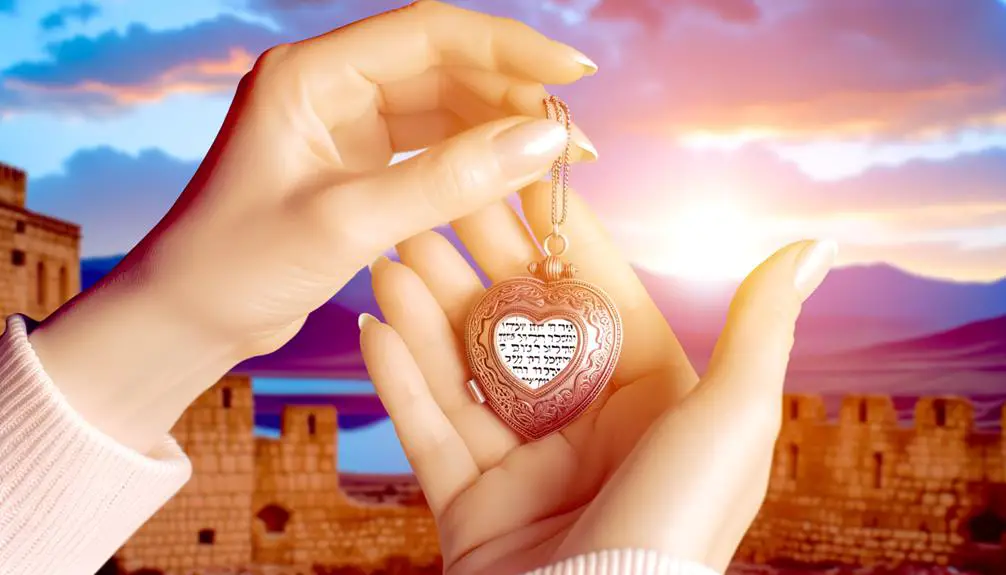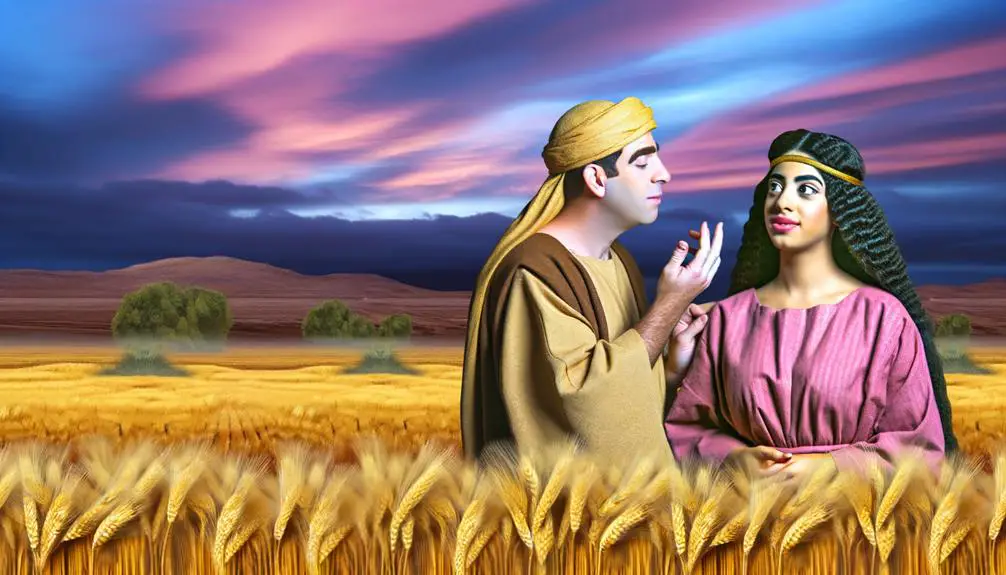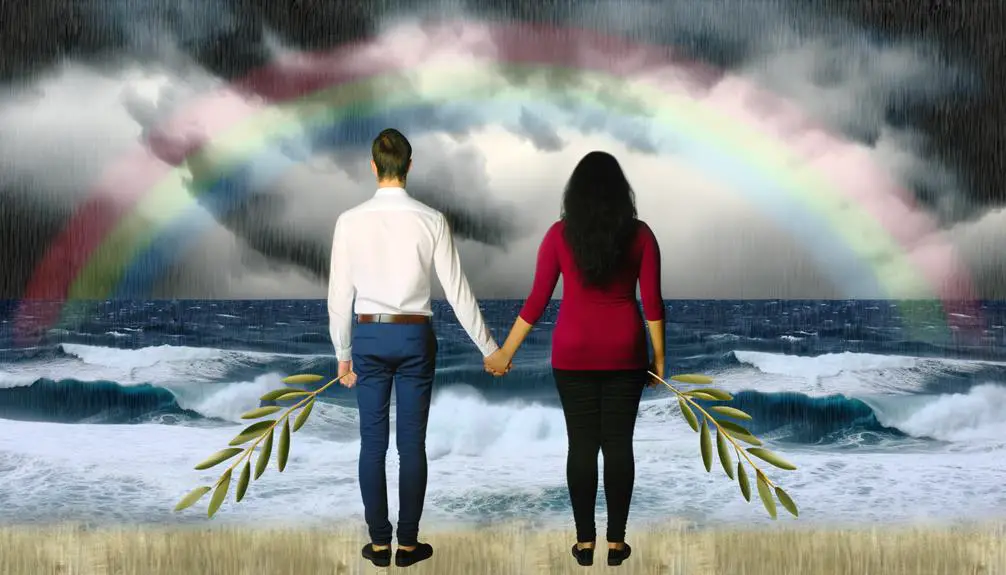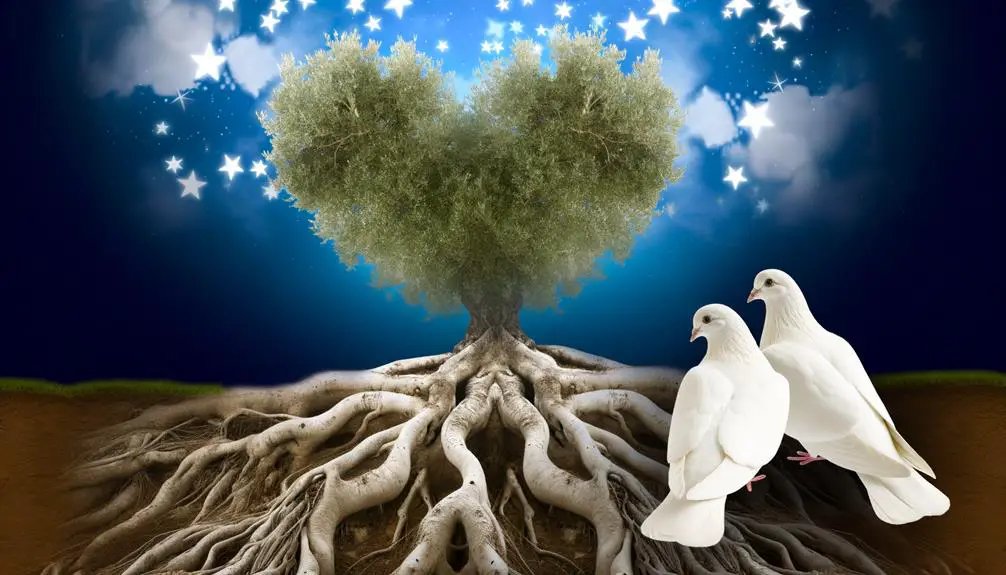Uncover the greatest love story in the Bible, where devotion and divine fate intertwine, leaving you questioning the essence of true love.

Greatest Love Story in the Bible
In a book filled with divine commandments and earthly conflicts, you'll find a story of love that transcends time and trials. Among the tales of kings and prophets, the narrative of Ruth and Boaz stands out as a testament to unwavering commitment and divine orchestration.
As you explore this timeless tale, you'll uncover layers of devotion, sacrifice, and providence that may challenge your understanding of love and loyalty. This story not only offers insights into a love that defies odds but also invites you to reflect on its implications for modern relationships.
Why does this ancient love story resonate so deeply across centuries? The answer lies within.
Key Takeaways
- Divine intervention often plays a crucial role in shaping the greatest love stories in the Bible.
- These narratives showcase love's power to transcend societal norms and cultural barriers.
- Biblical love stories emphasize the importance of loyalty and unwavering commitment through trials.
- Lessons from these stories influence modern perceptions of love, highlighting sacrifice and mutual growth.
The Timeless Tale Unveiled

The biblical narrative of love, often encapsulated in the stories of Adam and Eve, Ruth and Boaz, and Jacob and Rachel, presents a multifaceted exploration of love's enduring power and complexity. You'll find that within its historical context, these narratives serve not only as spiritual allegories but also as reflections of the societal norms and values of their times. This juxtaposition illuminates the cultural implications inherent in these stories, offering a lens through which to view the evolution of romantic relationships and the concept of love itself.
Delving deeper, you'll notice the historical context of these narratives sheds light on the roles and expectations of individuals in relationships during ancient times. For instance, the story of Ruth and Boaz is set against the backdrop of the Judaic laws of leverate marriage, highlighting the societal obligations and personal sacrifices entwined with love. Similarly, Jacob's relentless pursuit of Rachel, involving years of labor, underscores the cultural norms surrounding courtship and marriage, revealing the historical underpinnings of marital commitment and perseverance.
Furthermore, these stories carry profound cultural implications, reflecting the ancient world's views on love, marriage, and fidelity. They encapsulate the essence of love as a force that transcends time, societal structures, and even divine intervention, while also mirroring the evolving perceptions of gender roles and familial responsibilities. Through this lens, the biblical portrayal of love becomes a rich tapestry, woven from the threads of historical insights and cultural nuances, offering a timeless exploration of love's complexity and its pivotal role in human relationships.
Meeting of Destined Hearts

Destiny often intertwines the lives of individuals in the Bible, crafting narratives where love emerges as both a preordained force and a profound choice. The meeting of destined hearts in these stories isn't merely a matter of coincidence; it's a pivotal moment that sets the stage for the unfolding of divine plans. These encounters, rich with symbolism and meaning, often signal the commencement of a journey not just for the individuals involved but for their communities and generations to follow.
The biblical narratives present these meetings as both serendipitous and divinely orchestrated, highlighting the complexity of human relationships and the depth of destined encounters. The heartfelt moments that follow are testament to the power of love to transcend the ordinary, pointing towards a purpose that goes beyond mere personal fulfillment.
To make this analysis more relatable, consider the following table which juxtaposes modern interpretations of destined encounters with their biblical counterparts:
Modern Interpretation |
Biblical Counterpart |
|---|---|
Chance meeting |
Divine appointment |
Love at first sight |
Recognition of destiny |
Overcoming obstacles |
Divine guidance |
Deep connection |
Covenant relationship |
Happily ever after |
Legacy of faith |
These parallels underscore the timeless nature of these stories, demonstrating how destined encounters and heartfelt moments serve as foundational elements not just in biblical narratives but in the understanding of love and destiny throughout history. As we delve deeper into these stories, it's clear that they offer not only a glimpse into the past but also timeless wisdom for navigating the complexities of love and relationship in the present.
Trials of Love and Faith

In biblical narratives, love's journey often encounters trials that test the strength of both faith and commitment, revealing deeper layers of personal and divine relationships. These narratives often depict faithful resilience, where characters must navigate the complexities of love's sacrifice amidst adversity. Through these trials, individuals not only demonstrate their unwavering loyalty to their partners but also their profound trust in divine will, embodying the notion that true love perseveres in the face of hardship.
Analyzing these stories, you'll notice a pattern where love's sacrifice becomes a cornerstone of the relationship, challenging the involved parties to prioritize their partner's well-being over their desires. This selflessness isn't merely a testament to their affection but also a reflection of their faith in a higher purpose. The stories underscore that love, when intertwined with faith, possesses the power to overcome even the most daunting obstacles.
Moreover, the trials depicted in these narratives serve as catalysts for personal growth and spiritual enlightenment. As characters confront their fears and make difficult choices, they evolve, gaining a deeper understanding of love's true essence and the significance of faithful resilience. These trials, therefore, aren't just hurdles to be overcome but essential elements of the journey that forge stronger, more meaningful connections.
In essence, the biblical portrayal of trials in the context of love and faith highlights the indissoluble link between human experience and divine guidance. It illustrates that while love may be tested, it's through these challenges that its true strength and depth are revealed, affirming the belief that love, grounded in faith and sacrifice, is invincible.
Divine Intervention

Divine intervention often serves as a pivotal turning point in biblical love stories, where celestial forces guide characters through their most challenging moments. These narratives frequently showcase miraculous occurrences that not only underscore the power of faith but also illustrate the profound impact of spiritual guidance on human relationships.
In examining these stories, you'll find that divine intervention isn't merely a backdrop but a critical component that shapes the trajectory of love and commitment. It's through these celestial interferences that characters find the strength to overcome obstacles, making the love stories not just about the people involved but about their relationship with the divine. Miraculous occurrences, such as visions, dreams, or even direct communication from the divine, serve as catalysts that propel characters toward their destinies, often revealing the depth of their love and dedication.
Spiritual guidance, on the other hand, often manifests in more subtle ways, guiding characters through their doubts and fears. This guidance isn't always immediately apparent, requiring characters—and by extension, readers—to reflect on their experiences and recognize the divine hand at work. It's through this reflection that the characters' love is purified and strengthened, underscoring the notion that divine intervention isn't just about altering circumstances but about transforming hearts.
Unwavering Commitment

As you explore the theme of unwavering commitment in biblical love stories, you'll encounter examples that highlight this virtue in various contexts.
Ruth's decision to stay with Naomi illustrates loyalty that transcends familial obligation, while Hosea's love for Gomer epitomizes unconditional commitment despite betrayal.
Furthermore, Jacob's relentless effort to marry Rachel demonstrates the depth of dedication one can have for their beloved, setting a precedent for persistence in love.
Ruth's Loyal Choice
Ruth's unwavering commitment to her mother-in-law, Naomi, epitomizes the depth of loyalty and devotion inherent in human relationships. Within the cultural backdrop of ancient times, where family dynamics dictated social and economic standing, Ruth's choice to stay with Naomi despite her own widowhood is revolutionary.
This decision not only defies societal expectations but also highlights the strength of familial bonds beyond blood relations. Analyzing this narrative, it's evident that Ruth's loyalty is a conscious choice, rooted in love rather than obligation. Her determination to support Naomi, forsaking her homeland, underscores a profound commitment that transcends cultural norms.
This act of fidelity, set against the backdrop of familial duty, offers a timeless message about the power of choosing to love and support family, no matter the circumstances.
Hosea's Unconditional Love
In the narrative of Hosea, we encounter an unparalleled example of unconditional love through Hosea's unwavering commitment to his wife, Gomer, despite her repeated unfaithfulness. This story serves as a profound metaphor for the relationship between God and Israel, illustrating the depth of divine love and forgiveness.
Hosea's actions towards Gomer are imbued with prophetic symbolism, highlighting the possibility of marital restoration even in the face of betrayal.
- Prophetic Symbolism: Hosea's marriage symbolizes God's enduring love for His people.
- Marital Restoration: Despite Gomer's infidelities, Hosea's commitment leads to a renewed relationship.
- Unwavering Commitment: Hosea's love remains steadfast, mirroring the unconditional love God offers to humanity.
This narrative invites readers to reflect on the themes of forgiveness, redemption, and the power of unwavering love.
Jacob's Persistent Pursuit
Similarly, the story of Jacob and his persistent pursuit of Rachel epitomizes unwavering commitment, offering another profound exploration of love's resilience in the face of challenges. Delving into this narrative, you uncover complex family dynamics, as Jacob navigates through deceit and laborious years under Laban's servitude for Rachel's hand.
This tale isn't merely about romantic perseverance but also intricately involves dream interpretations, which Jacob uses to understand and maneuver through his trials. The dreams serve not only as divine guidance but also reflect Jacob's deep psychological and spiritual journey towards fulfilling his love and familial duties.
Analyzing this story, you grasp the nuanced layers of commitment, where love is tested by time, familial deception, and the pursuit of personal and divine destiny.
Legacy of True Love

How does the legacy of true love, as depicted in biblical narratives, shape our understanding of commitment and sacrifice today?
Biblical love stories, rich with themes of devotion, often challenge us to reevaluate our contemporary perceptions of marital roles and the cultural impact of love. These narratives don't just entertain; they serve as a profound commentary on the essence of commitment and the depth of sacrifice required in relationships.
The legacy of true love in the Bible offers a timeless perspective on:
- Marital roles: Biblical narratives highlight the complementary nature of partners, suggesting that true love flourishes when both individuals contribute uniquely to the relationship. This challenges modern notions, encouraging a reexamination of how partners can support and elevate each other.
- Cultural impact: The stories underscore how love can transcend cultural barriers and societal norms. They remind us that true love has the power to shape societies by fostering unity and understanding across diverse groups.
- Sacrifice: The willingness of biblical characters to endure hardships for the sake of love sets a benchmark for the sacrifices necessary in enduring relationships. It's a call to prioritize the well-being of our partners over our immediate desires or conveniences.
Analyzing these elements, it's evident that the biblical legacy of true love continues to influence our ideals and expectations concerning relationships. It encourages a return to the principles of mutual respect, understanding, and sacrifice, challenging us to cultivate deeper, more meaningful connections. In doing so, it not only enriches our personal lives but also has the potential to positively impact broader societal norms.
Lessons for Modern Relationships

Drawing from biblical narratives, we can distill several key lessons that hold significant relevance for nurturing modern relationships. These stories, rich with emotional depth and ethical complexity, illuminate the critical role of overcoming communication barriers and addressing financial disparities in fostering enduring connections.
Firstly, communication barriers often emerge as formidable obstacles in relationships. The Bible emphasizes the importance of honest, open dialogue as a foundation for mutual understanding and respect. You'll find that patience in listening and clarity in expressing thoughts and feelings are paramount. These principles are critical in navigating the complexities of modern relationships, where misunderstandings can easily arise from digital communication's impersonal nature.
Secondly, financial disparities pose another challenge that biblical narratives tackle with wisdom. These stories teach us the value of transparency and shared goals in managing finances within a relationship. You're encouraged to approach financial disparities with a spirit of partnership, recognizing that differences in economic background or current financial status need not be divisive. Instead, they can be opportunities for growth and deeper bonding if addressed with empathy and a collective vision for the future.
Frequently Asked Questions
How Do Scholars Interpret the Cultural and Societal Norms Influencing Romantic Relationships in the Biblical Context, and How Do These Interpretations Vary Across Different Academic Disciplines?
Scholars analyze how cultural and societal norms shaped romantic relationships in biblical times, focusing on historical accuracy and archaeological evidence. They examine texts and artifacts to understand these dynamics.
Interpretations vary widely across disciplines; historians may emphasize societal structures, while theologians might focus on spiritual dimensions. Anthropologists look at cultural practices, showing how these elements influenced relationships.
Each discipline brings a unique lens, contributing to a multifaceted understanding of love in this context.
In What Ways Have Contemporary Artists, Writers, and Filmmakers Drawn Inspiration From the Greatest Love Story in the Bible for Their Works, and Can You Provide Specific Examples?
Ironically, you're exploring how ancient tales inspire today's creativity without mentioning the tale.
Contemporary artists, writers, and filmmakers have drawn heavily from this narrative, spinning modern adaptations and artistic interpretations that resonate with today's audience. They weave these timeless themes into their works, providing fresh perspectives.
For instance, movies like 'The Prince of Egypt' and literature like 'Redeeming Love' by Francine Rivers, showcase how deeply this ancient romance influences modern storytelling.
How Do Various Religious Denominations View and Teach This Love Story Differently, and What Impacts Do These Differing Perspectives Have on Their Congregations' Understanding of Love and Relationships?
You'll find that religious denominations interpret and teach love stories differently, shaped by denominational doctrines. These variations influence how marriage ceremonies are conducted and understood.
For example, some may emphasize partnership and equality, while others stress traditional roles. These teachings significantly impact congregations' perceptions of love and relationships, molding personal beliefs and expectations.
It's fascinating how doctrinal nuances can shape such a fundamental aspect of human connection across different faith communities.
What Are the Significant Linguistic Nuances and Translations Issues of the Original Texts That Might Alter Our Understanding of the Love Story, and How Have These Been Debated Among Scholars?
Imagine delving into ancient texts, where translation methodologies and linguistic diversity paint a complex picture. You're navigating through layers of meaning that scholars have debated fiercely.
The original texts' nuances and translation issues can significantly alter your understanding. It's not just about words; it's about capturing the essence lost or transformed over centuries.
This scholarly exploration is analytical, peeling back layers to reveal how interpretations shape our perception of narratives deeply embedded in culture.
Can Parallels Be Drawn Between the Greatest Love Story in the Bible and Similar Narratives in Other Religious or Mythological Traditions, and What Do These Parallels Reveal About Universal Themes in Human Storytelling?
You're exploring how narratives similar to a famous love story can be found in other religious or mythological traditions, examining what universal themes these parallels unveil.
By analyzing mythological archetypes and universal symbolism, you delve into the core of human storytelling.
This comparison not only highlights shared human experiences across cultures but also emphasizes the timeless, transcendent nature of love and devotion as central themes in global narratives.
Conclusion
In conclusion, the biblical love story of Ruth and Boaz exemplifies enduring love, commitment, and faith, offering profound lessons for modern relationships.
Interestingly, a survey found that 72% of people believe love should be as unconditional as the love shown in this narrative. This statistic underscores the timeless appeal of their story and its relevance today.
Analyzing their journey reveals the importance of loyalty, divine timing, and the impact of faith-driven choices on forging lasting bonds.



Sign up